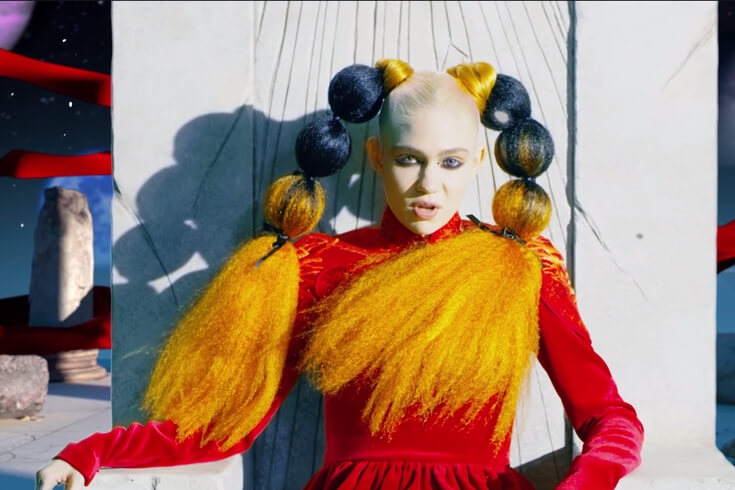Last November, Claire Boucher, the singer-producer who performs as Grimes, appeared on Mindscape, the podcast of theoretical physicist Sean Carroll. At a technology conference in Texas, Carroll had encountered an AI system that helps songwriters compose their melodies. When asked what she thought of this technology, Grimes said it was the future, not just of music but of artistic creation altogether. Within the next few decades, she predicted, computer intelligence will surpass the human brain, at which point all creative endeavours will be outsourced to machines—an achievement sometimes known as artificial general intelligence, or AGI. “Once there’s actual AGI, it’s going to be so much better at making art than us,” she said. People will still crave human connections, she later added, but these too might be convincingly replicated: “Everyone wants to be in a simulation. They don’t actually want the real world, even if they think they do.” What we’re yearning for, she continued, is “the shimmery perfected Photoshop world.”
On Twitter, the musicians piled on, with many calling her a techno-fascist, a proponent of a new world order, spurred by Silicon Valley innovation, in which humans merge with machines to become smarter, faster, and ultimately, less human. Nicole Hummel, who performs as Zola Jesus, called Grimes “the voice of silicon fascist privilege,” then wrote an essay on Patreon about the need to defend democracy against the Palo Alto elite. Devon Welsh, former frontman of electropop group Majical Cloudz—and a former boyfriend of Grimes—tweeted “lol sorry but fuck this” in response to the Mindscape appearance. He added, “Silicon-fascism is real, and has a vested interest in framing technological domination as the ‘natural progression’ of things. It isn’t, and I think most of us are not interested in being owned by unelected Silicon Valley kings.”
To understand the charges against Grimes, it helps to know a thing or two about accelerationism, a once-obscure philosophy that originated at the University of Warwick in the ’90s and then migrated to the Bay Area, where it found adherents among programmers, futurists, and venture capitalists. For accelerationists, liberal democracy—with its messy electoral politics and bloated state bureaucracies—cannot bring about the radical changes that humans crave. What we need instead, they argue, is technological upheaval. Left-wing accelerationists expect robotics and artificial intelligence to solve the climate crisis and liberate us from mind-numbing work. Far-right accelerationists see technology as an efficient means of social control; for this reason, some idealize the Chinese surveillance state.
Adjacent to accelerationism is the notion of transhumanism—the idea that we will soon overcome the limitations not only of our sclerotic social order but of our corporeal selves. Adherents envision a future in which virtual reality offers an escape from life, sex robots deliver new erotic highs, and a range of technologies, from computerized brain implants to performance-enhancing drugs, enable us to transcend our bodies and minds.
Not all forms of accelerationism and transhumanism are synonymous with fascism, but these philosophies are certainly influential among people with illiberal views. Central to accelerationist thought is a belief that the individual—the social unit around which liberal democracy is based—will soon become obsolete as technology subsumes (or, if you prefer, unites) us into a larger digital superstructure. Some accelerationists imagine a centralized intelligence that we will all plug in to. Others envision autonomous kingdoms run by CEO-monarchs who deliver social services and maintain order with extreme efficiency.
Is Grimes a proponent? Her critics argue that she’s at least guilty by association. In seemingly every online debate about her politics, somebody inevitably mentions her romantic partner, Tesla founder Elon Musk. Musk has at times spoken about the dangers of AI, yet his ventures have a transhumanist ring: he has co-founded, for example, a company dedicated to building brain-to-machine interfaces. Grimes’s connection to Musk was the clear subtext to Hummel’s and Welsh’s criticism. The implication was that she’d abandoned art and humanism to side instead with a tech-industry plutocrat whose values she was promoting. Other people were less coy about making this point. “Grimes has submitted to the corporate AI overlords,” one user exclaimed on Reddit, summing up an opinion that has been repeated across the internet. The Mindscape controversy rippled outward from social media, becoming part of the journalistic conversation on Grimes and her politics.
It’s a debate worth revisiting in light of her fifth record, Miss Anthropocene, released last Friday. Had critics faulted her merely for failing to think before she spoke, they would’ve had a point. (Grimes acknowledged as much recently in Interview magazine: “I just run my mouth like a fucking asshole, and there’s nothing I can do about it.”) But the larger accusation—that she’s a propagandist for a kind of techno-dystopian future—is a misreading of her work.
True, Grimes’s lyrics and videos often deal with simulation, virtual reality, nootropics, and AGI. But her depictions are frequently bleak. And if, at times, they depart from bleakness—if they are, occasionally, seductive—there’s no reason they shouldn’t be. To depict dystopia honestly, one must consider not only the things that make it terrifying but also the things that make it alluring. If humanity is to resist the lure of dystopian thinking, we have to at least understand that allure. Artists can help us do that.
Grimes is a difficult performer to reckon with, particularly if you’re the kind of fan that reduces art to simple political slogans. Are her songs parties or prophecies? Does the prospect of a tech dystopia make her terrified or giddy with anticipation? Pop records don’t come with moral instruction manuals, so listeners must figure these things out for themselves. Still, the notion of Grimes as a gleeful accelerationist is deeply reductive. It would be better to say that, despite her bleakness, Grimes is attuned to the aesthetic appeal of dystopia. This, by the way, is what makes her music so good.
When Grimes was a three-year-old in suburban Vancouver, her father read her J. R. R. Tolkien’s The Lord of the Rings and Frank Herbert’s Dune—sprawling novels set in meticulously realized worlds. There’s a similar world-building ambition to everything she does. Her songs are polyphonic, textured, and self-produced, often during painstaking studio sessions. She grew up on classical music and heavy metal before moving to Montreal and making a name for herself in the city’s vibrant noise-rock scene. She eventually relocated to Los Angeles and began embracing some (but not all) of the conventions of pop songwriting. The resulting music is best described via juxtapositions: sweet and thunderous, melodious and dissonant, pop and antipop.
In many songs, she sings not from her own perspective but from those of various characters: superheroes, demons, sentient robots. The moniker Grimes, she insists, is itself a persona, which she may someday kill off. She has also started identifying by the name “c,” a figure that physicists use to represent the speed of light in a vacuum. This constant shapeshifting makes it hard to pin her down ideologically. When she says something provocative—online, in a podcast, or in a song—is she speaking for herself or channelling a persona?
Her work depicts a variety of locales, some contemporary (sweaty dance clubs or the windy streets of Montreal) and some timeless (Grecian palaces or medieval ruins). Many of her more recent songs and videos, however, are set in a sinister future a bit like the ravaged, postapocalyptic landscape of Cormac McCarthy’s eco-thriller The Road and a bit like the totalitarian society of Aldous Huxley’s Brave New World, in which humans are placated with immersive entertainment and simulated intimacy to keep them from rebelling. The future will be bleak, Grimes seems to say, but there will be plenty of virtual thrills to distract you.
Does Grimes actually want to live in this world? Is she excited at the prospect of a “shimmery perfected Photoshop” dystopia, in which virtual reality and robot-made art divert people from the ecological wreckage around them? To her harshest critics, it would seem the answer is yes.
In fairness, you can see where they’re coming from. In Grimes’s work, dystopia can appear darkly seductive. The music video for “Genesis,” inspired by the hellscapes of Dutch Renaissance painter Hieronymus Bosch, depicts a gang of mostly female warriors preparing for battle in a futuristic world of scrubby deserts and dusky, abandoned beaches. The characters are every bit as beautiful as the landscapes they move through. “Kill v. Maim” portrays an underground bacchanal of gorgeous people dancing, fighting, and making out in a deserted subway station. At the end of the clip, a title card with the words “you died” appears on the screen, like in the video game Dark Souls. This detail suggests that the whole event was a sexy and sadistic VR simulation—bloody yet also bloodless.
But if Grimes’s visions of the future are sometimes enticing, they’re just as often foreboding. “My Name Is Dark” depicts the toll that amphetamines take on the human body, and “Darkside” depicts, with terrifying vividness, the experience of having a brain trapped inside a machine. (“Unrest is in our soul,” Grimes sings. “We don’t move our bodies anymore.”) Environmental despoliation is a common theme too. The video for “Venus Fly” sees Grimes dressed as an angel, her wings drenched in a viscous black fluid, like a rare bird caught in an oil slick. The song “Violence” likens the dynamic between humans and the natural environment to an abusive romantic relationship—sadistic, compulsive, and brutal.
Perhaps her most provocative song is “We Appreciate Power,” a 2019 single originally intended for Miss Anthropocene. A press release describes it as an anthem for “a Pro-AI Girl Group Propaganda machine who use song, dance, sex, and fashion to spread goodwill toward Artificial Intelligence.” It’s narrated from the perspective of the robots, who exhort listeners to stop worrying and embrace their new rulers. Submit to us, they demand. We’re magnificent and powerful and here to stay.
Grimes has said that the song was inspired by the Moranbong Band, the North Korean girl group whose membership is reportedly vetted by Kim Jong-un. The Moranbong singers appear in state spectacles, wearing sequined dresses and high heels and performing synth tunes in praise of the Kim dynasty. Their hooks are catchy as hell, but that catchiness is an aesthetic front for totalitarianism.
Many listeners have been unsure what to make of this reference. But, by openly comparing her song to Moranbong, the cheery face of North Korean totalitarianism, Grimes invites listeners to contemplate the narcotizing effect of pop music—the way it induces you to surrender. Over propulsive beats and chugging guitars, she sings threats (“What will it take to make you capitulate?”), exhortations (“Pledge allegiance to the world’s most powerful computer”), and creepy aphorisms (“You’re not even alive if you’re not backed up on a drive”). To see these lyrics as mere accelerationist propaganda is to miss the song’s unsettling irony.
Dystopias often come with the promise of transcendence or order or greatness. The early Italian fascists called for a new Rome, a metropolis every bit as grand as the imperial capital of the past—a Rome in which the streets would be wide and the trains would run on time. Leninist propaganda depicted a brotherly nation liberated from monarchs, clergymen, and capitalists. And today’s far-right accelerationists fantasize about a postdemocratic world in which all facets of human life are as streamlined as an Amazon purchase. None of these visions would’ve taken hold if they didn’t have some kind of appeal.
An artist’s job is to capture that appeal. Try to think of one half-decent dystopian novel or movie that doesn’t at times make dystopia seem neat. Consider Huxley’s Brave New World or its cinematic descendants, like the Blade Runner films and Spike Jonze’s Her—all of them about futures in which companies flood the market with entertainment and simulated intimacy, turning us into dehumanized, lonely addicts. These movies are meant to unsettle us, and they do, but they’re also colourful, sensual, and thrilling. They give us the imaginative pleasure of living in a world we shouldn’t actually want to.
For my money, the best film about fascism is Bernardo Bertolucci’s The Conformist. The work is an indictment of Italy’s bureaucratic corps, whose members cravenly fell in line behind Benito Mussolini, but visually, it’s a stunner. Bertolucci trains his camera on Rome’s EUR district, which contains some of the greatest exemplars of fascist architecture—stern colonnades, loggias, and marble edifices. Should we fault Bertolucci for capturing the aesthetic draw of the Il Duce era? On the contrary, to have done anything less would’ve been intellectually dishonest.
Similarly, had Grimes sought to depict dystopia and then failed to engage with the poetics of her subject matter, she would have told only half the story. She would have missed, crucially, the way dystopias spread—by tapping into our longings and aesthetic instincts. In Grimes’s songs, videos, and public statements, the distance between the things that fascinate her and the things that scare her can seem remarkably small. But the same is true in human life: the most malignant social forces are the ones that capture our imagination.
In reviews of Miss Anthropocene, a frequent criticism is that it lacks ideological lucidity. In Rolling Stone, Claire Shaffer observes that “what the album actually has to say about climate change is often lost under the admittedly beautiful, meticulously composed wreckage.” In The Quietus, C. J. Thorpe-Tracey complains that “a pile of reverb doesn’t make a basic jam more experimental; it just makes it harder to understand.” And, in the final sentence of an otherwise positive review in Pitchfork, Anupa Mistry writes, “Perhaps, before she was a pop star, Grimes might have made a statement with this album—but what the world needs now is less obfuscation, not more.” These critics are asking the same basic questions: Why can’t Grimes just clarify what she’s saying? Why can’t she tell us what to think?
A possible answer is that there’s value in thinking for ourselves. Instead of delivering sermons on the dangers of unbridled capitalism and technological acceleration, Grimes considers both the perils and promises of an accelerated future and then invites listeners to reckon with these contradictions. Perhaps that reckoning, tough as it may be, is worth our time. Perhaps it will make us better equipped to understand our confusing, tech-saturated world, with its utopian promises and dystopian portents.
Grimes’s songs always seem to be pulling you in two directions. The beats and basslines make you want to turn off your brain and dance, but then, inevitably, there’s a disruptive element—a dissonant chord, a grim turn-of-phrase—that jerks you out of your complacency and forces you to contemplate what you’re dancing to. This is the razor blade inside the candy. It shocks you because you weren’t expecting to find it there, and it changes how you feel about the entire confection.
Nowhere is this tendency more evident than in “We Appreciate Power.” At times, the piece harks back to Grimes’s noise-rock roots, with its distorted guitars, punishing kick drums, and blood-curdling screams. At other times, the noise dies down. Cacophony gives way to harmony, and you hear Grimes singing, in her most dulcet voice: “If you long to never die, baby plug in, upload your mind.” The dissonant parts of the song are frightening—but maybe not as frightening as the seductive parts.





